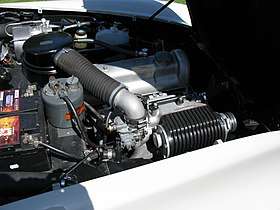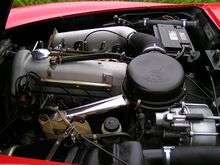Mercedes-Benz M121 engine
The Mercedes-Benz M121 engine was a 1.9 liter single overhead camshaft inline four-cylinder engine introduced by Mercedes in 1955 and used in various model lines during the 1950s and 1960s. Originally rated at 56 kW (76 PS; 75 hp) at 5500 RPM, it replaced the 1.8 liter M136 introduced in 1953, offering improved performance over the M136's lateral camshaft design.
| Mercedes-Benz M121 engine | |
|---|---|
 | |
| Overview | |
| Manufacturer | Mercedes-Benz |
| Layout | |
| Configuration | inline 4 |
| Displacement | 1.9 L (1,897 cc) 2.0 L (1,988 cc) |
| Cylinder bore | 85 mm (3.35 in) 87 mm (3.43 in) |
| Piston stroke | 83.6 mm (3.29 in) |
| Block material | Cast iron |
| Valvetrain | SOHC 2 valves x cyl. |
| Compression ratio | 8.5:1, 9.0:1 |
| Combustion | |
| Fuel system | Twin parallel Solex 38PDSJ carburetors |
| Fuel type | Gasoline |
| Cooling system | Water cooled |
| Output | |
| Power output | 75–110 hp (56–82 kW; 76–112 PS) |
| Torque output | 154 N⋅m (114 lb⋅ft) |
| Chronology | |
| Predecessor | M136 |
Applications included mid-size sedans, such as the 190, the 190SL roadster, and trucks such as the Unimog and L319 models.
History
The M121 engine was developed just after the end of World War II. It was built in the Sindelfingen Works factory, which assembled the Mercedes Ponton Model series to which the engine belonged to.[1] The M121 engine made its debut in 1955. It was the first generation of 4-cylinder engines from Mercedes Benz. The M121 replaced the less efficient M136 1.8-litre engine, a pre World War II engine that was introduced 2 years before in 1953. The M121 benefited from innovations and technology from Mercedes' larger engines such as the M186 3.0-litre and M180 2.2 liter engines. One of these innovations was a new single over head camshaft design which allowed for more power and efficiency. It was developed by a team led by Hans Scherenberg. Within this team, Karl-Heinz Goschel was one of the key engineers who developed the engine design.
The M121 series was in production until 1967, when the M115 series engine took its place.
M121 variants
M121
The M121 engine featured a single chain driven overhead camshaft layout with staggered valves operated by long and short rocker arms. The cylinder block was made from cast iron. The cylinder bore diameter for the M121 was 85 mm (3.35 in). The three ring crankshaft was forged. The stroke of the engine was 83.6 mm (3.29 in). This gave the M121 a displacement of 1.9 L (1,897 cc). The engine had a compression of 8.5:1. Through this configuration, the M121 BII engine had an initial rating of 110 hp (82 kW; 112 PS) at 5500 RPM and 114 lb⋅ft (155 N⋅m) of torque at 4000 RPM. After testing of the final vehicle, the power rating was lowered to 105 hp (78 kW; 106 PS). The crankshaft was carried by three main bearings. In the 190 SL, the engine had two parallel carburetors.

The M121 engine was distinctive during its time due to the fact that it stood upright in the engine compartment, and not at an angle like the 300SL's. Looking under the hood, one will notice a series of cast aluminum plenums. A circular air cleaner is mounted on the bulkhead. The aluminum plenums channel air from the air cleaner to the carburetors. Under the carburetors lie a 4 to 1 exhaust manifold.[2]
M121 BI
The newer W110 190 produced in the 1960s featured an updated version of the M121 engine. This version had an increase of 5 hp (4 kW; 5 PS) over the original version horsepower while fuel consumption stayed the same at 11.5 L/100 km (25 mpg‑imp; 20.5 mpg‑US) of premium fuel. The nose speed also increased to 150 km/h (93 mph), an improvement from the original's 139 km/h (86 mph). These performance increases were possible despite the new model's bodywork which was significantly heavier due to new safety implementations to the vehicle.
M121 BII
An updated version of the M121 engine, called the M121 BII, was produced for the Mercedes 190SL.[3] The four-cylinder unit has a single overhead camshaft and is regarded as the progenitor of an entire family of engines. The engine developed 77 kW (105 PS; 103 bhp) at 5700 RPM. For the 190SL, acceleration to 100 km/h (62 mph) took 14.5 seconds, and the top speed was 170 km/h (110 mph). This made the M121 BII one of the fastest engines on the road in its day. The fuel economy of the M121 BII was 8.6 L/100 km (33 mpg‑imp; 27 mpg‑US).
M121 BIX
The newest version of the M121 engine was the M121BIX. In this version, displacement increased from 1.9 to 2.0 L (1,897 to 1,988 cc) and was thus designated as a 2.0-litre engine. This increase in displacement was possible due to a 2 mm (0.079 in) increase in bore from 85 to 87 mm (3.35 to 3.43 in). The compression ratio was also increased to a value of 9.0:1. This engine also used a new Solex 38PDSJ carburetor. Through these various improvements, power was increased to 95 hp (71 kW; 96 PS) at 5200 RPM and 154 N⋅m (114 lb⋅ft) of torque was possible at a reasonable 3600 RPM. The M121 BIX engine was produced from 1965 to 1968 for the Mercedes Benz W110 model series.
Applications
The M121 engine was first employed in the Mercedes Benz "Ponton" models such as the 180. The 190 models featured an updated version of the M121 which featured greater performance through variations in compression ratios and improved carburetor systems. Its use continued in the W110 "Fintail" 190c and 200. The M121 engine has also been used in trucks such as the Mercedes-Benz L319 which was produced in 1967. 1967 1956. Some Unimog off-road models also implemented the M121.
References
- "Historical Perspective" Archived 2010-12-29 at the Wayback Machine, Mercedes Benz Ponton, Retrieved on 11-22-2010.
- "1955-1963 Mercedes-Benz 190SL", How Stuff Works, September 18, 2007. Retrieved on 11-22-2010.
- "Mercedes-Benz Ponton Technical Data", Mercedes-Benz Ponton, Retrieved on 2010-10-27.
- Hodzic, Muamer. "Mercedes-Benz gasoline engines since 1945 ", Mercedes Insider, June 24, 2008. Retrieved on 11-22-2010.
- "1955-1963 Mercedes-Benz 190SL" Archived 2010-05-24 at the Wayback Machine, Serious Wheels, Retrieved on 11-22-2010.
- Winning Foursomes Archived 2011-01-11 at the Wayback Machine, eMercedesBenz, March 25, 2008. Retrieved on 11-22-2010.